Unit6 I'm going to study computer science.Grammar focus一般将来时课件(共25张PPT)
文档属性
| 名称 | Unit6 I'm going to study computer science.Grammar focus一般将来时课件(共25张PPT) | 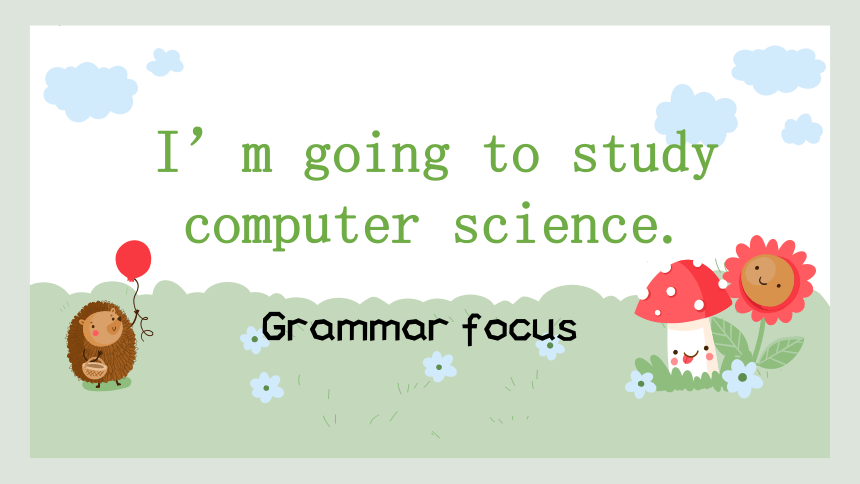 | |
| 格式 | zip | ||
| 文件大小 | 19.9MB | ||
| 资源类型 | 教案 | ||
| 版本资源 | 人教新目标(Go for it)版 | ||
| 科目 | 英语 | ||
| 更新时间 | 2022-08-15 16:23:01 | ||
图片预览

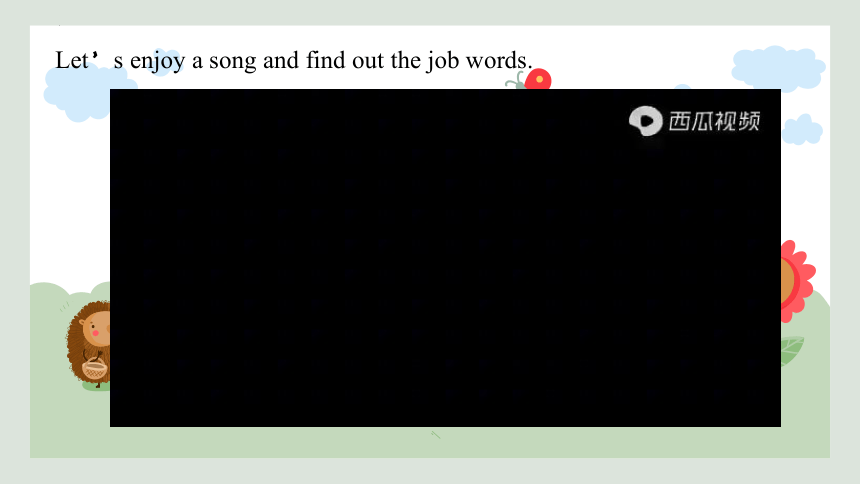
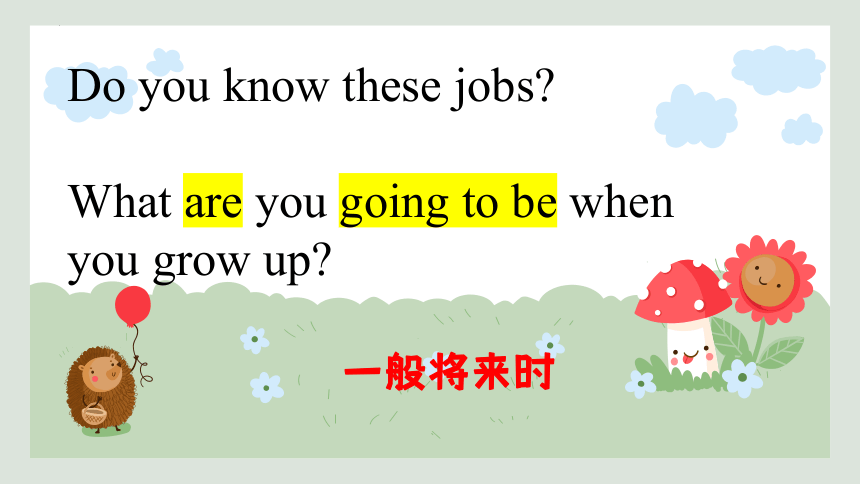

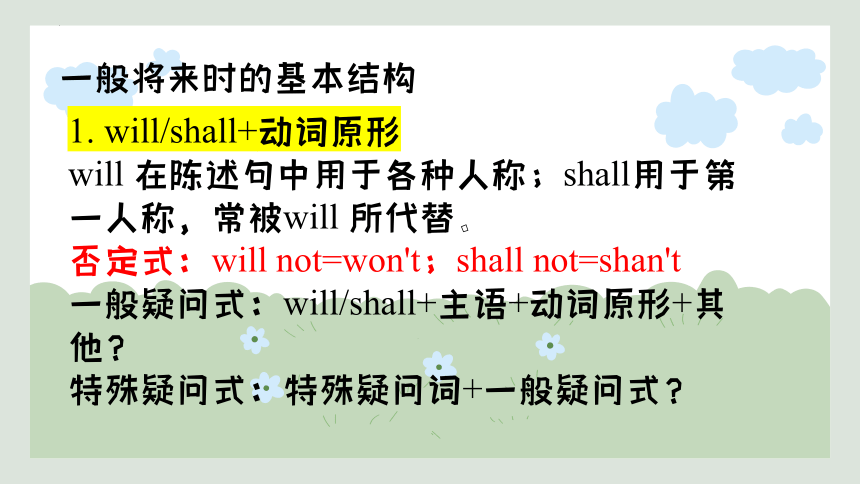
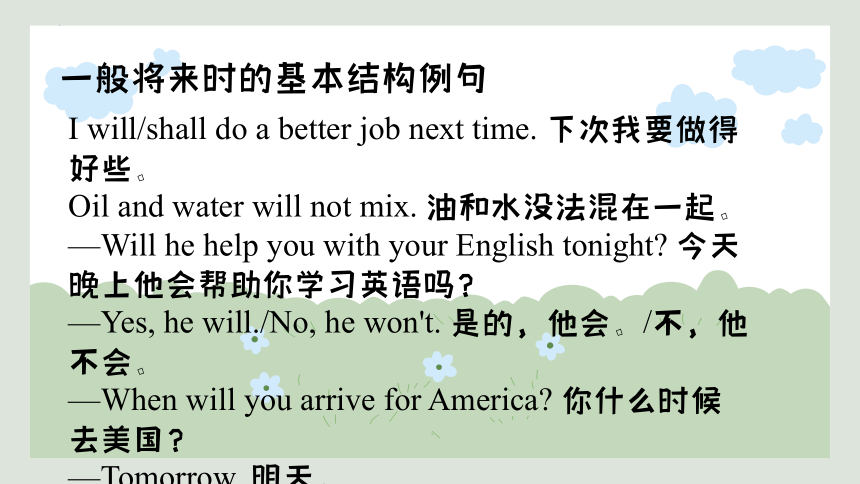
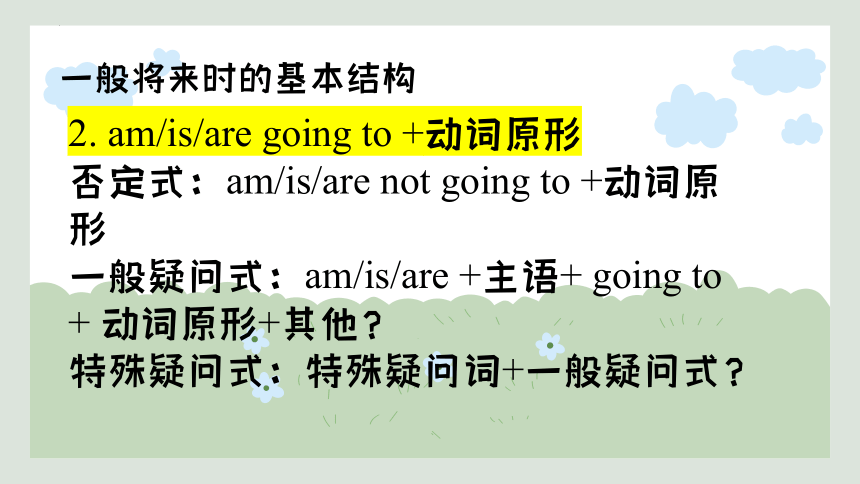
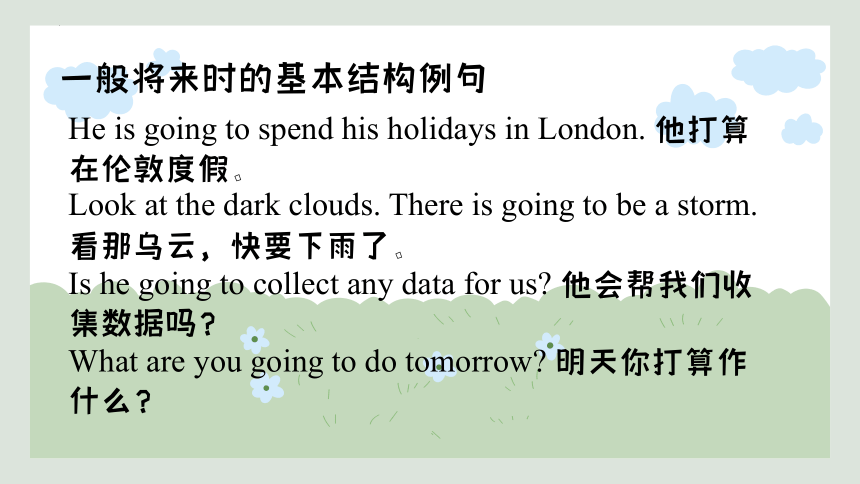
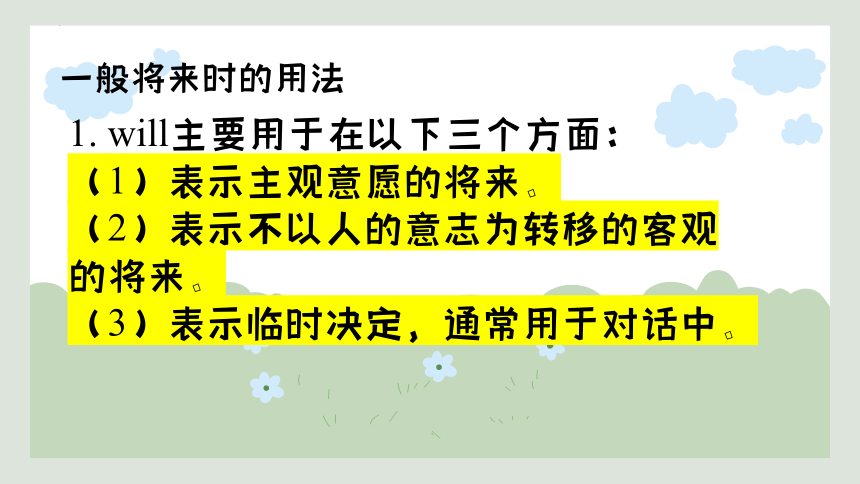
文档简介
(共25张PPT)
I’m going to study computer science.
Grammar focus
Let’s enjoy a song and find out the job words.
Do you know these jobs
What are you going to be when you grow up
一般将来时
一般将来时表示将来某个时间要发生的动作或状态,或将来经常发生的动作或状态。
一般将来时的含义
1. will/shall+动词原形
will 在陈述句中用于各种人称;shall用于第一人称,常被will 所代替。
否定式:will not=won't;shall not=shan't
一般疑问式:will/shall+主语+动词原形+其他?
特殊疑问式:特殊疑问词+一般疑问式?
一般将来时的基本结构
I will/shall do a better job next time. 下次我要做得好些。
Oil and water will not mix. 油和水没法混在一起。
—Will he help you with your English tonight 今天晚上他会帮助你学习英语吗?
—Yes, he will./No, he won't. 是的,他会。/不,他不会。
—When will you arrive for America 你什么时候去美国?
—Tomorrow. 明天。
一般将来时的基本结构例句
2. am/is/are going to +动词原形
否定式:am/is/are not going to +动词原形
一般疑问式:am/is/are +主语+ going to + 动词原形+其他?
特殊疑问式:特殊疑问词+一般疑问式?
一般将来时的基本结构
He is going to spend his holidays in London. 他打算在伦敦度假。
Look at the dark clouds. There is going to be a storm. 看那乌云,快要下雨了。
Is he going to collect any data for us 他会帮我们收集数据吗?
What are you going to do tomorrow 明天你打算作什么?
一般将来时的基本结构例句
1. will主要用于在以下三个方面:
(1)表示主观意愿的将来。
(2)表示不以人的意志为转移的客观的将来。
(3)表示临时决定,通常用于对话中。
一般将来时的用法
1. will主要用于在以下三个方面:
(1)表示主观意愿的将来。
They will go to visit the factory tomorrow.
明天他们将去厂参观工厂。
I’ll come with Wang Bing, Liu Tao and Yang Ling.
我将和王兵、刘涛、杨玲一起来。
一般将来时的用法
1. will主要用于在以下三个方面:
(2)表示不以人的意志为转移的客观的将来。
Today is Saturday. Tomorrow will be Sunday.
今天是星期六。明天是(将)是星期日。
一般将来时的用法
1. will主要用于在以下三个方面:
(3)表示临时决定,通常用于对话中。
—Mary has been ill for a week.
玛丽病了一周了。
—Oh, I didn't know. I will go and see her.
噢,我不知道。我去看看她。
一般将来时的用法
2. be going to主要用于一下两个方面:
(1)表示事先经过考虑、安排好打算、计划要做某事。
Dad and I are going to watch an opera this afternoon.
今天下午我和爸爸打算去看歌剧。
(2)表示根据目前某种迹象判断,某事非常有可能发生,表示推测。
Look! There come the dark clouds. It is going to rain.
瞧!乌云密集。天要下雨了。
一般将来时的用法
1. 用现在进行时表示将来。
瞬时动词和持续动词都可以用其现在进行时表达将来的含义,主要表示按规定或时间预计要发生的事。(瞬时动词的进行时任何时候都表示将来的含义,持续动词的进行时只有在含有将来的时间状语或将来语境的条件下才表示将来)
The bus is coming. 公交车就要来了。
The students are leaving on Sunday. 学生们星期日出发。
用其他时态表示将来含义的情况
2. 用一般现在时表示将来。
(1)come, go, arrive, leave, start, begin, return等瞬时位移动词的一般现在时可以表示将来含义,主要用来表示在时间上已确定或安排好的事情。
The train leaves at six tomorrow morning. 火车明天上午六点开。
(2)在时间或条件状语从句中。(主将从现)
I'll write to you as soon as I arrive there. 我到了那里,就写信给你。
If it doesn't rain tomorrow, we will have a party in the park. 如果明天不下雨,我们就在公园举行一个聚会。
用其他时态表示将来含义的情况
肯定式:There will be;There is/are going to be
否定式:There won't be;There is/are not going to be
一般疑问式:Will there be...;Is/are there going to be...
特殊疑问式:特殊疑问词+一般疑问式
There be结构的一般将来时
(2019天津)---What is your plan for next weekend,Lingling
----I volunteer work in the museum.
A. was doing B. did
C. have done D. am going to do
正确答案D。句意是:玲玲,下周末的安排是什么?我打算到博物馆去作志愿者。根据上文的next weekend(下周末)可知,玲玲的回答是指下周的打算,所以用一般将来时,因此,正确答案为D。
2019四川内江)---Have you watched the new movie,Joe
---No,I________ it with my sister this evening.
A.watch B.are watching C.watched D.will watch
正确答案:D。句意是:乔,你看了这部新电影吗?没有。我今晚将和我妹妹一起去看。根据本句末的时间状语this evening可知,看新电影这动作是将来要做的事情,因此动词使用一般将来时。所以, 正确答案为D。。
(2019湖南湘西)---We will go for a picnic if it _____ this Sunday.
----Sounds great.
A.won’t rain B.is sunny C.will be sunny
【析】正确答案:B。句意是:本周性其他我们要去郊游。听起来不错。在if引导的条件状语从句中,用一般现在时表示一般将来时,所以正确答案为B.
(2019江苏南通)There is something wrong with my computer.
—Don’t worry. I (deal) with it for you.
will deal
(2019江苏南通)There is something wrong with my computer.
—Don’t worry. I (deal) with it for you.
will deal
What are you going to be when
you grow up
I want to be a teacher.
How are you going to do that
I’m going to study really hard.
Choose a job to make a new dialogue.
我的理想
我想成为一名车辆工程师
设计出世界上最厉害的车,
可以带着同学们环游太空,去九天揽月
Thank you!
I’m going to study computer science.
Grammar focus
Let’s enjoy a song and find out the job words.
Do you know these jobs
What are you going to be when you grow up
一般将来时
一般将来时表示将来某个时间要发生的动作或状态,或将来经常发生的动作或状态。
一般将来时的含义
1. will/shall+动词原形
will 在陈述句中用于各种人称;shall用于第一人称,常被will 所代替。
否定式:will not=won't;shall not=shan't
一般疑问式:will/shall+主语+动词原形+其他?
特殊疑问式:特殊疑问词+一般疑问式?
一般将来时的基本结构
I will/shall do a better job next time. 下次我要做得好些。
Oil and water will not mix. 油和水没法混在一起。
—Will he help you with your English tonight 今天晚上他会帮助你学习英语吗?
—Yes, he will./No, he won't. 是的,他会。/不,他不会。
—When will you arrive for America 你什么时候去美国?
—Tomorrow. 明天。
一般将来时的基本结构例句
2. am/is/are going to +动词原形
否定式:am/is/are not going to +动词原形
一般疑问式:am/is/are +主语+ going to + 动词原形+其他?
特殊疑问式:特殊疑问词+一般疑问式?
一般将来时的基本结构
He is going to spend his holidays in London. 他打算在伦敦度假。
Look at the dark clouds. There is going to be a storm. 看那乌云,快要下雨了。
Is he going to collect any data for us 他会帮我们收集数据吗?
What are you going to do tomorrow 明天你打算作什么?
一般将来时的基本结构例句
1. will主要用于在以下三个方面:
(1)表示主观意愿的将来。
(2)表示不以人的意志为转移的客观的将来。
(3)表示临时决定,通常用于对话中。
一般将来时的用法
1. will主要用于在以下三个方面:
(1)表示主观意愿的将来。
They will go to visit the factory tomorrow.
明天他们将去厂参观工厂。
I’ll come with Wang Bing, Liu Tao and Yang Ling.
我将和王兵、刘涛、杨玲一起来。
一般将来时的用法
1. will主要用于在以下三个方面:
(2)表示不以人的意志为转移的客观的将来。
Today is Saturday. Tomorrow will be Sunday.
今天是星期六。明天是(将)是星期日。
一般将来时的用法
1. will主要用于在以下三个方面:
(3)表示临时决定,通常用于对话中。
—Mary has been ill for a week.
玛丽病了一周了。
—Oh, I didn't know. I will go and see her.
噢,我不知道。我去看看她。
一般将来时的用法
2. be going to主要用于一下两个方面:
(1)表示事先经过考虑、安排好打算、计划要做某事。
Dad and I are going to watch an opera this afternoon.
今天下午我和爸爸打算去看歌剧。
(2)表示根据目前某种迹象判断,某事非常有可能发生,表示推测。
Look! There come the dark clouds. It is going to rain.
瞧!乌云密集。天要下雨了。
一般将来时的用法
1. 用现在进行时表示将来。
瞬时动词和持续动词都可以用其现在进行时表达将来的含义,主要表示按规定或时间预计要发生的事。(瞬时动词的进行时任何时候都表示将来的含义,持续动词的进行时只有在含有将来的时间状语或将来语境的条件下才表示将来)
The bus is coming. 公交车就要来了。
The students are leaving on Sunday. 学生们星期日出发。
用其他时态表示将来含义的情况
2. 用一般现在时表示将来。
(1)come, go, arrive, leave, start, begin, return等瞬时位移动词的一般现在时可以表示将来含义,主要用来表示在时间上已确定或安排好的事情。
The train leaves at six tomorrow morning. 火车明天上午六点开。
(2)在时间或条件状语从句中。(主将从现)
I'll write to you as soon as I arrive there. 我到了那里,就写信给你。
If it doesn't rain tomorrow, we will have a party in the park. 如果明天不下雨,我们就在公园举行一个聚会。
用其他时态表示将来含义的情况
肯定式:There will be;There is/are going to be
否定式:There won't be;There is/are not going to be
一般疑问式:Will there be...;Is/are there going to be...
特殊疑问式:特殊疑问词+一般疑问式
There be结构的一般将来时
(2019天津)---What is your plan for next weekend,Lingling
----I volunteer work in the museum.
A. was doing B. did
C. have done D. am going to do
正确答案D。句意是:玲玲,下周末的安排是什么?我打算到博物馆去作志愿者。根据上文的next weekend(下周末)可知,玲玲的回答是指下周的打算,所以用一般将来时,因此,正确答案为D。
2019四川内江)---Have you watched the new movie,Joe
---No,I________ it with my sister this evening.
A.watch B.are watching C.watched D.will watch
正确答案:D。句意是:乔,你看了这部新电影吗?没有。我今晚将和我妹妹一起去看。根据本句末的时间状语this evening可知,看新电影这动作是将来要做的事情,因此动词使用一般将来时。所以, 正确答案为D。。
(2019湖南湘西)---We will go for a picnic if it _____ this Sunday.
----Sounds great.
A.won’t rain B.is sunny C.will be sunny
【析】正确答案:B。句意是:本周性其他我们要去郊游。听起来不错。在if引导的条件状语从句中,用一般现在时表示一般将来时,所以正确答案为B.
(2019江苏南通)There is something wrong with my computer.
—Don’t worry. I (deal) with it for you.
will deal
(2019江苏南通)There is something wrong with my computer.
—Don’t worry. I (deal) with it for you.
will deal
What are you going to be when
you grow up
I want to be a teacher.
How are you going to do that
I’m going to study really hard.
Choose a job to make a new dialogue.
我的理想
我想成为一名车辆工程师
设计出世界上最厉害的车,
可以带着同学们环游太空,去九天揽月
Thank you!
同课章节目录
- Unit 1 Where did you go on vacation?
- Section A
- Section B
- Unit 2 How often do you exercise?
- Section A
- Section B
- Unit 3 I'm more outgoing than my sister.
- Section A
- Section B
- Unit 4 What's the best movie theater?
- Section A
- Section B
- Unit 5 Do you want to watch a game show?
- Section A
- Section B
- Unit 6 I'm going to study computer science.
- Section A
- Section B
- Unit 7 Will people have robots?
- Section A
- Section B
- Unit 8 How do you make a banana milk shake?
- Section A
- Section B
- Unit 9 Can you come to my party?
- Section A
- Section B
- Unit 10 If you go to the party, you'll have a grea
- Section A
- Section B
